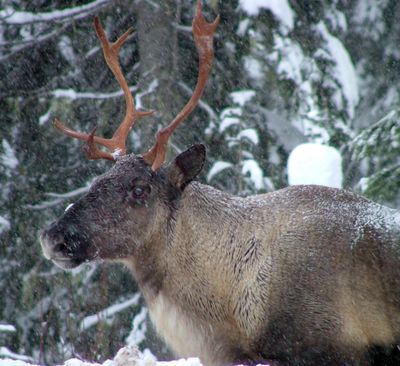Lawsuit filed to protect caribou
Selkirk herd could disappear, groups say

Editor’s note: Part of this article was cut off in some editions of Friday’s newspaper because of a production error. Here is the story in its entirety.
Woodland caribou in the Selkirk Mountains are so imperiled that they could vanish within the next 20 years, extinguishing the last caribou herd in the Lower 48 states, environmental groups say.
In a lawsuit filed Thursday, four environmental groups blamed the Bush administration for the caribou’s shrinking numbers, saying it hasn’t done enough to keep snowmobiles out of prime habitat.
Six years ago, the groups petitioned the U.S. Fish and Wildlife Service to designate “critical habitat” for the caribou. In critical habitat areas, the federal government is prohibited from allowing actions that would destroy habitat. At the time, Fish and Wildlife officials said they didn’t have enough money to identify and protect key habitat areas.
“Caribou is by far the most endangered species in this country,” said Mike Petersen, executive director of the Lands Council in Spokane. “There are only a few dozen left. We feel that just ignoring the problem like the Bush administration has done is not a solution to recovery.”
The Lands Council and other plaintiffs are suing in hopes a judge will require the Obama administration to designate critical habitat for caribou, Petersen said. The suit was filed in Eastern Washington’s U.S. District Court. Other plaintiffs are Defenders of Wildlife, the Selkirk Conservation Alliance and the Center for Biological Diversity.
The suit notes that a caribou recovery plan authored by the federal government calls for protecting 443,000 acres of habitat to “support a self-sustaining caribou population.” Most of the land is in the Idaho Panhandle and Colville national forests.
Petersen said designating critical habitat would help guide the Forest Service on actions like the winter recreation plan the agency is developing for 400,000 acres surrounding Priest Lake. For the past several years, the popular snowmobile area has been managed by court order – a result of successful lawsuits by environmental groups, which contend the agency failed to protect caribou from the growing ranks of snowmobilers.
Woodland caribou once roamed the northern continental United States, ranging from Washington to Maine.
Hunting and habitat destruction whittled the herds to nearly nothing. In 1983, caribou were listed as an endangered species under an emergency order.
About 46 caribou are believed to belong to the southern Selkirk herd, which includes caribou that migrate into southern British Columbia. Unlike deer and elk, caribou head to high elevations during deep snows, using their broad hooves like snowshoes.
They feed on lichens in old-growth forests.
But their penchant for the high country brings them into conflict with snowmobiles. Ever more powerful, snowmobiles can venture onto ridgetops that once were off-limits.
Noise and people cause caribou to shun certain areas, said Suzanne Audet, Fish and Wildlife’s caribou recovery coordinator.
Audet, who hadn’t seen the suit, couldn’t comment directly. But she said officials initially declined to designate critical habitat because they were afraid that publicizing areas that caribou used would attract poachers. More recently, the cost of defending lawsuits has drained the agency’s resources for designating critical habitat, she said.
The caribou’s decline includes factors besides snowmobiles, Audet added.
Extensive logging and wildfires altered the old-growth habitat that caribou need for survival.
As the forest changed, deer and elk populations flourished, attracting more mountain lions to the area.
Biologists believe many of the 103 caribou transplanted from Canada to the southern Selkirk herd in the late 1980s and 1990s ultimately were eaten by cougars, she said.
In the past five years, the herd’s numbers have stabilized, which Audet credits to more liberal cougar hunting regulations in Washington and Idaho.